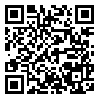Volume 7, Issue 3 (2019)
CLRJ 2019, 7(3): 173-196 |
Back to browse issues page
1- Ph.D. student of Farsi Language and Literature, Islamic Azad University, Kashan Branch, Faculty of Humanities, Kashan Branch, Islamic Azad University, Kashan, Iran. , bakashirin@yahoo.com
2- Ph.D. student of Farsi Language and Literature, Islamic Azad University, Kashan Branch, Faculty of Humanities, Kashan Branch, Islamic Azad University, Kashan, Iran.
3- Associate Professor of Farsi Language and Literature, Faculty of Humanities, Yazd Branch, Islamic Azad University, Yazd, Iran.
2- Ph.D. student of Farsi Language and Literature, Islamic Azad University, Kashan Branch, Faculty of Humanities, Kashan Branch, Islamic Azad University, Kashan, Iran.
3- Associate Professor of Farsi Language and Literature, Faculty of Humanities, Yazd Branch, Islamic Azad University, Yazd, Iran.
Abstract: (7551 Views)
The theme of Isfahani and Hindi style poetry is ultimately selected, and since the poetry of Saadi and Hafez humorous people to think. Such a poetic style is unmatched by Iranian literary historians in the periods of Khorasani and Iraqi. It was not considered by the poets and poets of the later period, as well as by the dictators, and they wrote in the Tazkars, it was difficult to select from several tens of thousands of bits of Sa'eb. Today, Biddle's poetry is unfamiliar to Iranian professors and students, and returns to his unusual surprise in his poetry. Therefore, the present research can somehow clarify and distinguish the styles of Isfahan and Hindi and the two representatives of these two styles, Saeb and Biddle. On the same basis, the following article proves the following hypotheses by examining and analyzing the two abovementioned styles: most literary critics have considered the style of Hindi and Esfahani as one of them, and they have mentioned many common aspects, but with a little delay it can be seen that these two styles Despite abundant common features, they do not fit perfectly. Paying attention to the three elements of language, time and place in Saeb and Biddle's poetry reveal the poetic differences between these two poets and prove their style.
Keywords: style
Saeb, Biddle
Poetic differences
Lightweight
Article Type: Qualitative Research |
Subject:
Comparative research
Received: 2018/12/18 | Accepted: 2019/02/13 | Published: 2019/09/1
Received: 2018/12/18 | Accepted: 2019/02/13 | Published: 2019/09/1
| Rights and permissions | |
 |
This work is licensed under a Creative Commons Attribution-NonCommercial 4.0 International License. |



